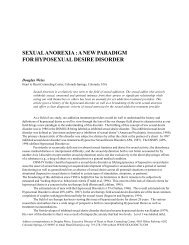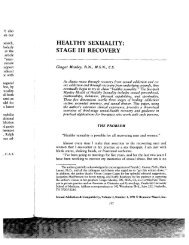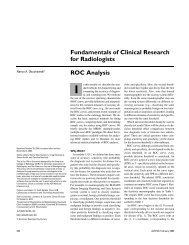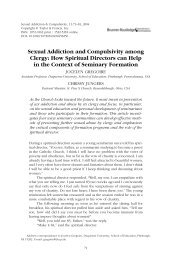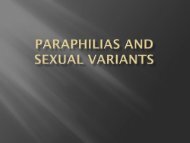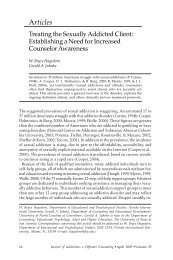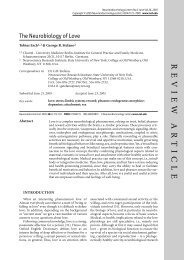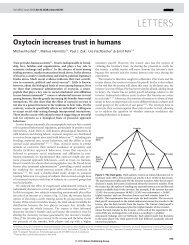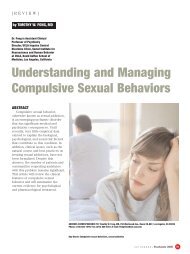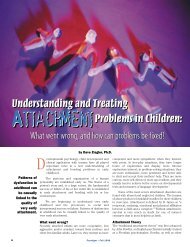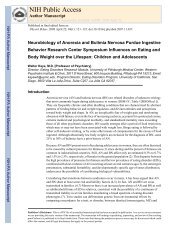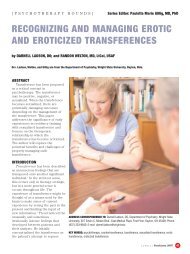50i. Physical: assaults, excessive restraint, abuse <strong>of</strong> psychotropic medication;ii. Psychological: Harassment, bullying, intimidation, humiliation, withholding necessary ordesirable goods;iii. Financial: unauthorized use <strong>of</strong> a person’s property or finances, fraudulent misrepresentationsto social institutions;iv. Sexual: Sexual abuse <strong>of</strong> varying forms;v. Neglect: depriving a person <strong>of</strong> food, or basic social goods, residing in unhygienic or squalidhomes, physical neglect e.g. bed sores, hypostatic complications.Up to 25% <strong>of</strong> vulnerable older adults report abuse in the previous month, which equates with6% <strong>of</strong> the general elderly population being subject to such treatment. 348 Despite these alarmingstatistics very few cases <strong>of</strong> elder abuse are reported. 349 In jurisdictions where there are mandatoryrequirements to report elder abuse there is a tension between breaching the patient’s confidentialityand the clinician’s obligation to beneficence. 350Pharmacological Treatment in DementiaOne particular area <strong>of</strong> concern in the psychiatry <strong>of</strong> old age is the use <strong>of</strong> psychotropic drugs inthe care <strong>of</strong> patients in nursing homes suffering from dementia. Australian figures indicated that47.2% <strong>of</strong> nursing home residents were being administered one or more psychotropic drugsregularly, with 3.5% given such medications pro re nata. In recent times, there has been a clinicaltrend towards the use <strong>of</strong> second generation antipsychotics, particularly for the management <strong>of</strong>behavioural disturbances arising from dementia. 351 The main ethical concerns raised by this issuerelate primarily to the capacity <strong>of</strong> such patients to provide informed consent to such treatment.Whilst there are guidelines in various settings as to how consent may be obtained from sourcesother than the patient, a UK study highlighted that up to 15% <strong>of</strong> nursing home residents were notcapable <strong>of</strong> consenting to either being in a nursing home or taking medications. This study showedthat up to 6% <strong>of</strong> these patients were given psychotropic medications without consent. 352 Moreover,an Australian study demonstrated that in the vast majority <strong>of</strong> cases, the legal processes for proxyconsent to such treatment were not being adhered to. 353 The issue is made more problematic by therecent concerns that the efficacy <strong>of</strong> newer antipsychotic medications in behavioural disturbancesarising from dementia is disputed, and more alarmingly, these medications appear to be associatedwith an increased risk <strong>of</strong> stroke or other cardiovascular complications. 354Distributive Justice in Old Age PsychiatryThe other theme which emerges in the literature is in relation to access to psychiatric treatment forelderly patients. One argument, based on presumably utilitarian grounds, holds that the access theelderly should have to psychiatric treatments should be limited, purely on the grounds <strong>of</strong> age, 355 akinto the views <strong>of</strong> Daniels about healthcare in the elderly in general 158 or the utilitarian approaches <strong>of</strong>Peter Singer. 33 Such a view has been argued to value a person’s productivity over their freedomfrom distress, or preservation <strong>of</strong> dignity. 356Research in PsychiatryThe Nuremburg DeclarationConcerns about the ethics <strong>of</strong> psychiatric research emerged following the revelations <strong>of</strong> human rightsabuses in the Nazi era, 357 resulting in international declarations <strong>of</strong> ethical guidelines for research,such as the Declaration <strong>of</strong> Helsinki 358 (See Appendix 3), and the requirements for ethical approval<strong>of</strong> studies as part <strong>of</strong> the process <strong>of</strong> scientific publishing. 359 The crimes <strong>of</strong> the Nazi doctors weredescribed earlier, and the main focus <strong>of</strong> the “doctor’s trial” in the Nuremburg war crimes tribunalin 1945 was the issue <strong>of</strong> research conducted on prisoners in concentration camps or patients inpsychiatric institutions. The kinds <strong>of</strong> experiments conducted by criminals such as Josef Mengele(the doctor at the Auschwitz-Birkenau death camp) were both cruel and <strong>of</strong> poor quality scientifically.The crimes <strong>of</strong> the Nazi doctors have been well documented and the reasons for such moral lapseshave been analysed from various angles. Lifton’s account 357 <strong>of</strong> the mechanism <strong>of</strong> ‘doubling’, in whichthose involved in abuses <strong>of</strong> patients dissociated their personal and pr<strong>of</strong>essional lives, remains the
Applied <strong>Psychiatric</strong> <strong>Ethics</strong>3most compelling examination <strong>of</strong> the question “how did this happen?”, although the “why did thishappen” remains elusive. This is the most critical question, as any attempt to prevent recurrence <strong>of</strong>such crimes requires a clear articulation as to why they occurred, so that such preconditions canbe identified and prevented in the future. Dudley and Gale noted that the “why?” emerged througha process <strong>of</strong> peer pressure, uncritical devotion to duty, careerism, denial facilitating deceptivelanguage, and the influence <strong>of</strong> a faceless bureaucracy. 360The intellectual origins <strong>of</strong> the Nazi doctors require some consideration in order to try to frame thekind <strong>of</strong> ethical oversight that would prevent such crimes from re-occurring. Many bioethicists havegrappled with the apparent intellectual preconditions to the Nazi project. As described previously,the sociologist Max Weber warned us that bureaucracies had lost sight <strong>of</strong> values and concernedthemselves only with outcomes. This loss <strong>of</strong> values led to humans in the social system being placedin a moral void, or what he described as a “polar night <strong>of</strong> icy darkness”. 172 Despite the contribution<strong>of</strong> an amoral, pragmatic bureaucracy in the Nazi era, the eugenic movement remains the mainculprit in the crimes <strong>of</strong> the Nazi doctors. Malthus had warned humanity that expanding populationsthreatened the very existence <strong>of</strong> human-kind on the planet. 361 Malthusian ideas encouraged theviewpoint that the intrinsic value <strong>of</strong> human beings was negotiable. Eugenics was by no meansunique to German psychiatry. The British academic Francis Galton was so enamoured <strong>of</strong> theseminal thesis <strong>of</strong> Darwin, that he called for all public policy to be based upon the notion <strong>of</strong> naturalselection. 362 Eugenic ideas permeated American psychiatry contemporaneously with Germanpsychiatry. 363 In 1913, the German psychiatrist Alfred Ploetz founded the “German Society for RacialHygiene”. <strong>An</strong>other psychiatrist, Ernst Rüdin referred to the cause <strong>of</strong> removing inferior genetic stockfrom the population as ”Schädlingsbekämpfung” (pest control). In 1918, Emile Kraeplin called forstrong political leadership to effect ‘a decline in mental debility’. 36451Hitler’s moral philosophy was predicated upon Darwinian principles. Many leading Darwinianbiologists and social thinkers in Germany believed that Darwinism had superseded traditionalJudeo-Christian and Enlightenment ethics, in particular the value such philosophies placed uponall human life. The moral relativism which emerged from the exaltation <strong>of</strong> the evolutionary “fitness”<strong>of</strong> the species as the source <strong>of</strong> a moral good was at the core <strong>of</strong> this “pseudo-ethics”. 365 O’Mathúnaargued that five key ideas were central to the actions <strong>of</strong> the Nazi doctors – moral relativism, blurreddistinctions between animals and humans, the existence <strong>of</strong> human inequality, the notion that somelives have no value and natural selection as a valid determinant <strong>of</strong> human dignity. 366Regardless <strong>of</strong> the intellectual bankruptcy <strong>of</strong> Nazi racial ideology, Darwinian ideas and evolutionarypsychiatry are still popular. Indeed, there is a strong evolutionary psychiatry movement, whichseeks to understand human psychopathology in terms <strong>of</strong> the natural history <strong>of</strong> our species. 367Moreover, the conceptualization <strong>of</strong> psychiatric disorder is moving inexorably towards the molecularlevel, 368 where depression or anxiety may be defined more in terms <strong>of</strong> the possession <strong>of</strong> particularalleles <strong>of</strong> genes, rather than the traditional verstehende Psychologie <strong>of</strong> Jaspers. 369 Whilst it is notreasonable to assume a moral equivalence between the current, somewhat reductionist paradigms<strong>of</strong> evolutionary psychiatry or genetics, there is a need to reflect upon neuropsychiatry potentiallylosing sight <strong>of</strong> the intrinsic value <strong>of</strong> humans. Kant’s notion <strong>of</strong> “Menscheit” refers to the humanpotential for autonomy, or unconstrained rational self–governance. 370 This is one approximation <strong>of</strong>the intrinsic value <strong>of</strong> humans, even the most irrational or intellectually disabled person. Kant’s formula<strong>of</strong> humanity has it that humans must be ends in themselves, and never a means to such an end. 59Such notions were clearly lost in the Nazi era, a fact made all the more tragically ironic in that AdolfEichmann, the Nazi functionary who was responsible for the so-called “Final Solution”, proudlyproclaimed at his trial for crimes against humanity that he was a Kantian. 74Losing sight <strong>of</strong> the essential value <strong>of</strong> humans seems to be at the core <strong>of</strong> the <strong>of</strong> the Nazi doctors’crimes. The moral philosophy which emerged in the aftermath <strong>of</strong> the Holocaust, through theworks <strong>of</strong> Baumann 170 and Levinas, 371 emphasized that the crisis in Western ethics brought aboutby the Nazi era resided in the perceived loss <strong>of</strong> the value <strong>of</strong> human beings, no matter what theirbackground.A common method <strong>of</strong> argument in bioethical debate is to position a particular issue with reference toNazism. Polemicists like Peter Singer, whose advocacy for termination <strong>of</strong> grossly deformed fetusesis <strong>of</strong>ten compared to the excesses <strong>of</strong> Nazism, contribute to such emotive debates. What is not clearare the specifics <strong>of</strong> the fundamental moral failure <strong>of</strong> the Nazi doctors. Many rationalizations wereIMET AN OVERVIEW OF PSYCHIATRIC ETHICS



